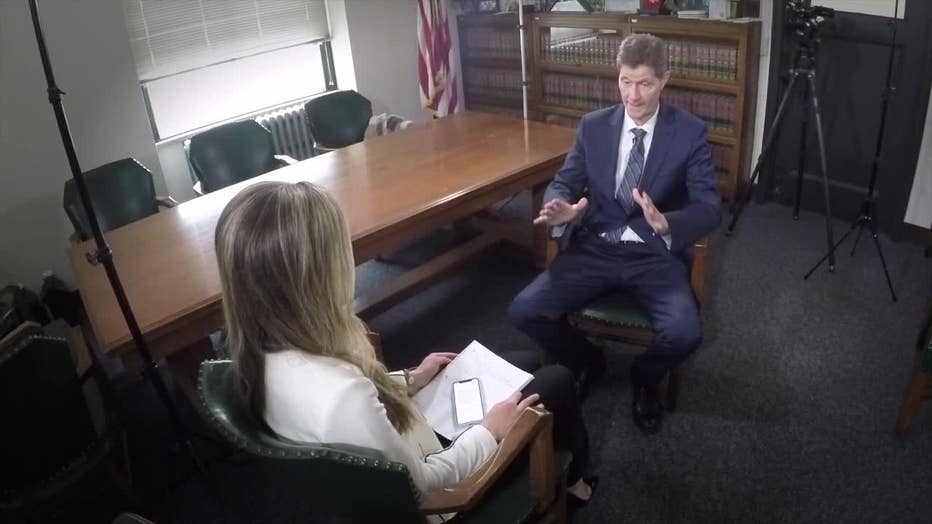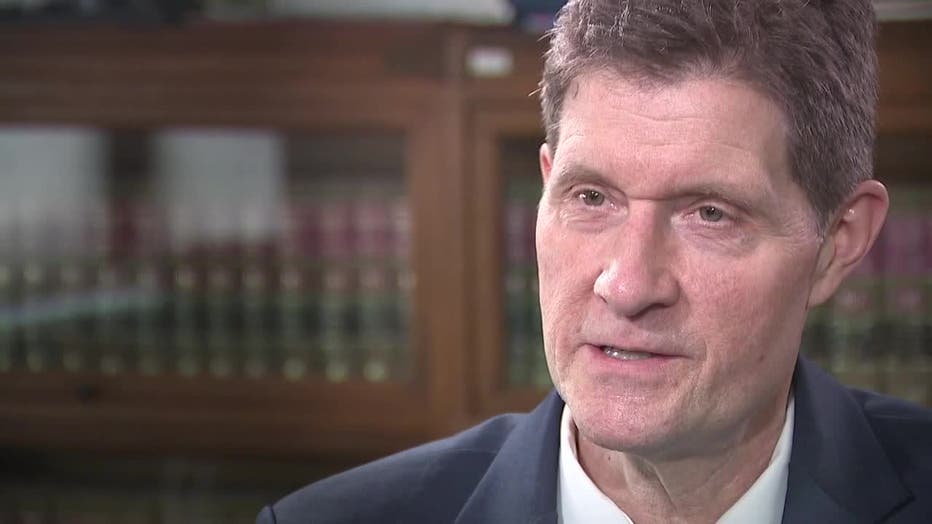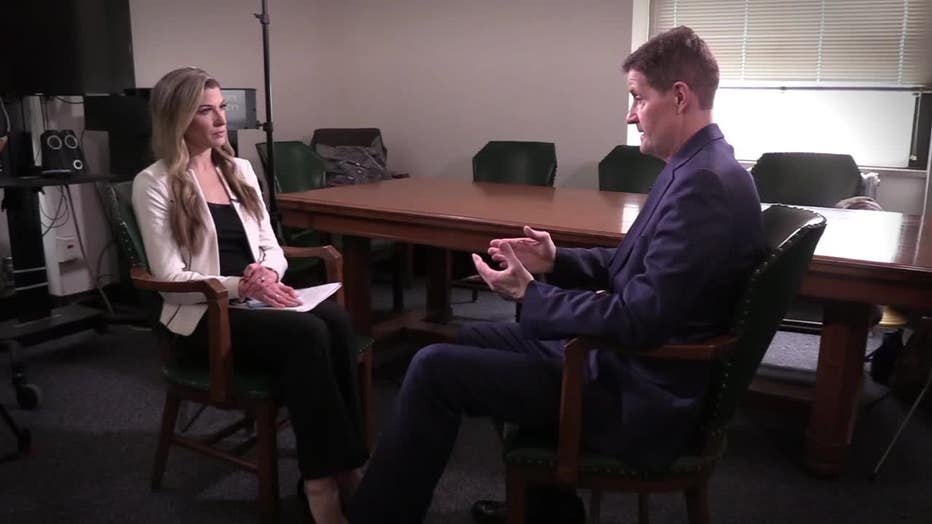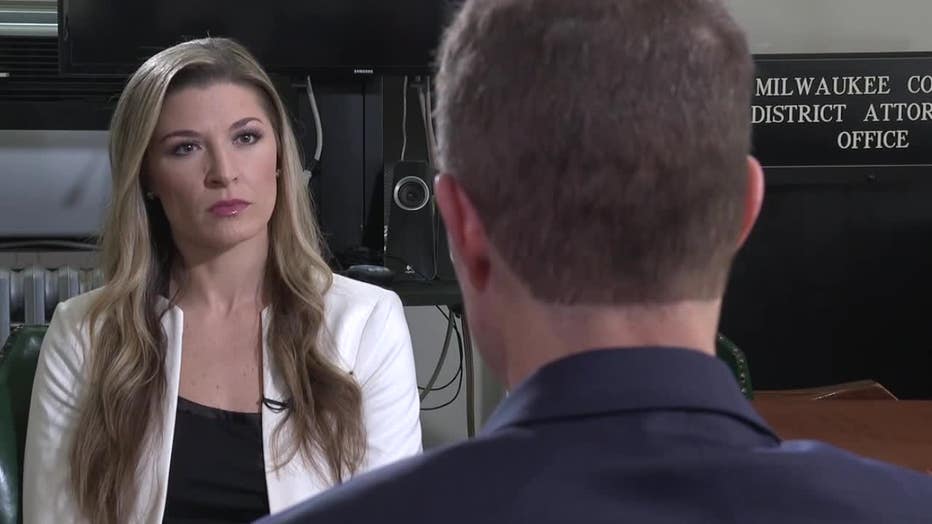Prosecutor's perspective: John Chisholm talks 1-on-1 with FOX6 News
John Chisholm talks 1-on-1 with FOX6 News
FOX6's Stephanie Grady sat down one-on-one with District Attorney John Chisholm to talk about the status of Milwaukee from his perspective as a prosecutor.
MILWAUKEE - It is a difficult job – one that comes with politics and pressure. The spotlight has been on the Milwaukee County District Attorney's Office most recently because of a case involving Darrell Brooks, the suspect at the center of the Waukesha Christmas Parade attack.
FOX6's Stephanie Grady sat down one-on-one with District Attorney John Chisholm to talk about the status of Milwaukee from his perspective as a prosecutor – considering he has been DA of Milwaukee County for 15 years.
Stephanie Grady: [You’ve been DA for 15 years]. What have you seen change over the course of that time in the city of Milwaukee as a whole?
John Chisholm: As a whole, I’ve seen some really almost amazing changes in terms of the depth of knowledge that people have about the positive things about Milwaukee, but also, the negative things. The thing that concerns everyone the most is the violence. That’s the thing we saw in the early 1990s, and the highest levels [of homicides] we reached in the 90s was in the 160s. In the last three years, we have actually surpassed those numbers. I have to tell you, I never expected to see that again in my professional career.

Stephanie Grady: Do you think there are similarities between the crime in the 90s and the crime now?
John Chisholm: Yes, I do. Some of it has to do with the issue related to destabilization. In the early 90s, it was the economy that had changed so dramatically.
Stephanie Grady: Do you think that the state of the economy now and the way inflation is going that things are going to get worse before they get better in terms of crime?
John Chisholm: I certainly hope not. I think the most important thing that we can do right now is focus in on getting all the institutions in this community that have some impact on addressing people who have serious needs -- whatever those needs might be -- mental health issues, drug addiction issues, education issues, employment issues, that we get all of those institutions back up again, including the courthouse.
SIGN UP TODAY: Get daily headlines, breaking news emails from FOX6 News
Stephanie Grady: Talk to me about that and the staffing issues your office has faced?
John Chisholm: It’s been a tremendous challenge. We have high rates of turnover, and the fact that the courts were limited in how many cases they could address for about a year has created a backlog in the range of 11,000 cases and it’s all serious cases crime cases that we need to get on top of as quickly as possible.

John Chisholm
Stephanie Grady: Do you feel as though violent crime has just overshadowed everything in Milwaukee at this point?
John Chisholm: It has overshadowed everything in every major city around the country.
Stephanie Grady: Do you think bail reform in Wisconsin is needed?
John Chisholm: I’ve always made the argument we should be able to talk honestly with the courts among ourselves about what the purpose is of detaining somebody who’s been accused of a crime, and I obviously feel strongly that the more serious the behavior, that is, the greater the risk that person poses to the community, the court should be able to assess a person’s risk, not just their ability to pay.

Stephanie Grady: Darrell Brooks has become the face of bail reform here in Wisconsin. Do you think the risk assessment in his situation failed?
John Chisholm: No. Actually, the risk assessment in his situation worked. Other parts of the system failed, and I’ve already acknowledged our responsibility for not making a much stronger recommendation for detention in that case but ultimately, the job of setting bail is a judicial function.
FREE DOWNLOAD: Get breaking news alerts in the FOX6 News app for iOS or Android
Stephanie Grady: So you would agree, though, that bail reform is needed in Wisconsin? There should be a change to the Constitution?
John Chisholm: I would support that, yes.

Stephanie Grady: Would you agree that it's become politicized?
John Chisholm: In some aspects, it’s politicized. There’s some things you could do about bail that do not make sense, like, for example, mandatory bail for these certain categories of offenses.
Stephanie Grady: And that’s what’s being asked right now.
John Chisholm: That’s one of the things being asked. I don’t think that’s necessary.
Stephanie Grady: Why?
John Chisholm: No one case is exactly the same as the next. You have to use discretion. You have to look at all the facts that are particular to that case before you set a bail, and if you start going to mandatory bail, you’re going to start finding disparities again.
Stephanie Grady: What is your response to the argument that you have to start at least somewhere, and setting those minimum requirements for certain offenses is that starting point?
John Chisholm: My response to that is exactly what you hired judges and court commissioners to do is to use sound discretion on each and every one of these cases, just as you expect prosecutors to do – that the judges have to be expected to do the same. Mandatory minimums actually take that discretion away and can oftentimes cause more harm than good.
Stephanie Grady: You are not in the news every day, but when you are, sometimes it’s good news; sometimes it’s critical news. During those critical moments, like during the Darrell Brooks situation, how does your family take that pressure? Does your wife have a tough time? Because sometimes that’s harder for them than the person in the spotlight.
John Chisholm: It always is. The Chisholm family are all public servants, right, so I’ve been blessed in that sense that we all understand the privilege is actually to serve and so, with it comes the negative aspect of it that intense pressure.
Stephanie Grady: Do you plan to re-run?
John Chisholm: I take that every year. Right before the election year, I sit down, and I talk to my family. I talk to people in the office. I talk to the community, and I make that decision then. I haven’t made any decision on that whatsoever. Just focusing on the job.
Stephanie Grady: At this point, you think the good still overshadows the bad?
John Chisholm: I do.
Stephanie Grady: Hoping to keep it that way?
John Chisholm: That’s it. That’s the challenge.
Stephanie Grady: That’s your job.
John Chisholm: That’s it.
Stephanie Grady: Well, thank you so much for this.
John Chisholm: Yep, glad to do it.
The interview with John Chisholm took place before the 20 people were shot in Milwaukee after the Bucks’ playoff game. Stephanie asked Chisholm his reaction to the shootings and how far along in the process his office is in apprehending and charging those responsible. His office provided this statement:
"The shootings downtown after the Bucks game, like in many other communities nationwide, demonstrate that an increasing number of people, even those with little or no prior criminal histories, are resolving disputes with firearms leading to devastating results."

